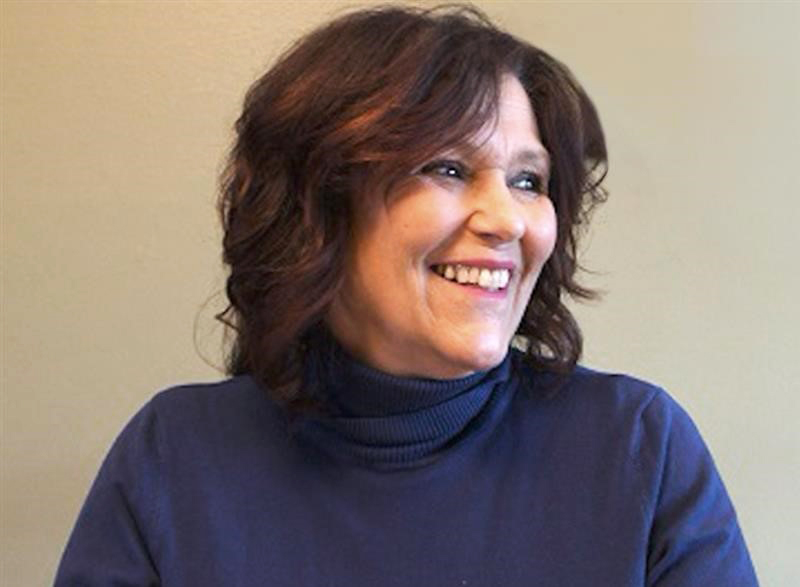MISSION, KS / ACCESSWIRE / August 10, 2021 / When Julie J. isn't gardening, she's working as a hairdresser, which she finds "artistic and feeds the soul." She also faces a challenge that more than 150,000 other people in the U.S. also face, according to the American Cancer Society - Julie is living with metastatic breast cancer.

This is not a new journey for Julie, as she was first diagnosed with stage 3 breast cancer in 2007. While she celebrated 10 years of her cancer in remission, it unfortunately returned in 2017. This time, Julie was diagnosed with HER2 positive metastatic breast cancer. She recalls, "It was definitely tough to hear. But I wanted to show my kids that I was strong and hopeful that I could fight cancer again."
Upon receiving the news, Julie and her husband learned everything they could about her form of cancer and worked with her oncologist on a treatment plan. 'My oncologist is very compassionate but also honest," said Julie. "She takes the time to answer all of our questions, which has made all the difference in my treatment journey.'
A Treatment That Targets the HER2 Protein
In collaboration with her care team, Julie learned that HER2 (human epidermal growth factor receptor 2) is a protein found on the surface of cells that is associated with tumor growth. Approximately one in five people diagnosed with breast cancer are HER2 positive, which means that cancer cells may grow and spread faster than other types of breast cancers.[1]
Advancements in HER2 positive breast cancer treatments have provided several options for patients like Julie. In 2020, her oncologist recommended ENHERTU® (fam-trastuzumab deruxtecan-nxki), which is approved by the FDA for adults with HER2 positive breast cancer that cannot be removed by surgery or that has spread to other parts of the body, and who have received two or more prior anti-HER2 breast cancer treatments. ENHERTU was FDA approved for this use based on a clinical study that measured how many patients responded and how long they responded. ENHERTU is still being studied to confirm these results. It is not known if ENHERTU is safe and effective in children.
ENHERTU can cause serious side effects including lung problems that may be severe, life threatening, or that may lead to death; low white blood cell count; heart problems that may affect your heart's ability to pump blood; or harm to an unborn baby.
See Important Safety Information below.
ENHERTU is made up of a monoclonal antibody with cancer-killing medicine and works by using HER2 as a target to deliver the cancer-killing medicine to the cancer cell. The discovery of HER2 directed therapies like ENHERTU has significantly changed how patients with HER2 positive breast cancer are treated.
Today, Julie receives an intravenous infusion of ENHERTU once every three weeks. "Having progressed on my previous anti-HER2 therapies, I feel very fortunate to still have a treatment option. While I've experienced some fatigue and thinning of my hair, my doctor says I'm doing very well," says Julie.
Patients should speak with their doctor about the treatment option that is right for them.
Living Life
Julie is optimistic and finds small joys each day. 'Sometimes when I'm driving, I'll take the scenic route. It reminds me that there are beautiful things out there.'
She also works to inspire others. "Through my story, I want other women living with HER2 positive metastatic breast cancer to be reminded that they still have a lot to give, a lot to learn, and a lot to live for."
Important Safety Information
What is the most important information I should know about ENHERTU?
ENHERTU can cause serious side effects, including:
Lung problems that may be severe, life-threatening or that may lead to death. If you develop lung problems your healthcare provider may treat you with corticosteroid medicines. Tell your healthcare provider right away if you get any of the following signs and symptoms:
- Cough
- Trouble breathing or shortness of breath
- Fever
- Other new or worsening breathing symptoms (e.g., chest tightness, wheezing)
Low white blood cell count (neutropenia). Low white blood cell counts are common with ENHERTU and can sometimes be severe. Your healthcare provider will check your white blood cell counts before starting ENHERTU and before starting each dose. Tell your healthcare provider right away if you develop any signs or symptoms of an infection or have fever or chills during treatment with ENHERTU.
Heart problems that may affect your heart's ability to pump blood. Your healthcare provider will check your heart function before starting treatment with ENHERTU. Tell your healthcare provider right away if you get any of the following signs and symptoms:
|
|
Your healthcare provider will check you for these side effects during your treatment with ENHERTU. Your healthcare provider may reduce your dose, delay treatment or completely stop treatment with ENHERTU if you have severe side effects.
Harm to your unborn baby. Tell your healthcare provider right away if you become pregnant or think you might be pregnant during treatment with ENHERTU.
If you are able to become pregnant, your healthcare provider should do a pregnancy test before you start treatment with ENHERTU.
Females who are able to become pregnant should use effective birth control (contraception) during treatment with ENHERTU and for at least 7 months after the last dose.
Males who have female partners that are able to become pregnant should use effective birth control (contraception) during treatment with ENHERTU and for at least 4 months after the last dose.
Before you receive ENHERTU, tell your healthcare provider about all of your medical conditions, including if you:
- Have lung or breathing problems.
- Have signs or symptoms of an infection.
- Have or have had any heart problems.
- Are breastfeeding or plan to breastfeed. It is not known if ENHERTU passes into your breast milk. Do not breastfeed during treatment with ENHERTU and for 7 months after the last dose.
Tell your healthcare provider about all the medicines you take, including prescription and over‑the‑counter medicines, vitamins, and herbal supplements.
How will I receive ENHERTU?
You will receive ENHERTU into your vein through an intravenous (IV) line by your healthcare provider.
ENHERTU is given 1 time every three weeks (21-day treatment cycle).
Your healthcare provider will decide how many treatments you need.
Your healthcare provider may slow down or temporarily stop your infusion of ENHERTU if you have an infusion-related reaction, or permanently stop ENHERTU if you have severe infusion reactions.
If you miss a planned dose of ENHERTU, call your healthcare provider right away to schedule an appointment. Do not wait until the next planned treatment cycle.
What are the possible side effects of ENHERTU?
ENHERTU can cause serious side effects. See 'What is the most important information I should know about ENHERTU?'
The most common side effects of ENHERTU, when used in people with breast cancer, include:
|
|
ENHERTU may cause fertility problems in males, which may affect the ability to father children. Talk to your healthcare provider if you have concerns about fertility.
These are not all of the possible side effects of ENHERTU. Call your doctor for medical advice about side effects. You may report side effects to Daiichi Sankyo at 1-877-437-7763 or to FDA at 1-800-FDA-1088.
What is ENHERTU?
ENHERTU is a prescription medicine used in adults to treat human epidermal growth factor receptor 2 (HER2)‑positive breast cancer that cannot be removed by surgery or that has spread to other parts of your body (metastatic), and who have received two or more prior anti-HER2 breast cancer treatments.
ENHERTU was FDA approved for this use based on a clinical study that measured how many patients responded and how long they responded. ENHERTU is still being studied to confirm these results.
It is not known if ENHERTU is safe and effective in children.
Please visit www.ENHERTU.com for full Prescribing Information, including Boxed WARNINGS, and Medication Guide.
Visit www.ENHERTU.com to learn more about this treatment option for people with previously treated HER2 positive metastatic breast cancer and to download patient and caregiver resources.
Sponsored by Daiichi Sankyo and AstraZeneca.
ENHERTU® is a registered trademark of Daiichi Sankyo Company, Limited.
©2021 Daiichi Sankyo, Inc. and AstraZeneca.
PP-US-ENB-0687
06/21
[1] Cancer.Net. ASCO: Breast Cancer. Accessed May 2021.
Contact:
Michael French
mfrench@familyfeatures.com
1-888-824-3337
editors.familyfeatures.com
About Family Features Editorial Syndicate
A leading source for high-quality food, lifestyle and home and garden content, Family Features provides readers with topically and seasonally relevant tips, takeaways, information, recipes, videos, infographics and more. Find additional articles and information at Culinary.net and eLivingToday.com.
SOURCE: Family Features
View source version on accesswire.com:
https://www.accesswire.com/659153/One-Womans-Optimistic-Outlook-After-A-HER2-Positive-Metastatic-Breast-Cancer-Diagnosis





